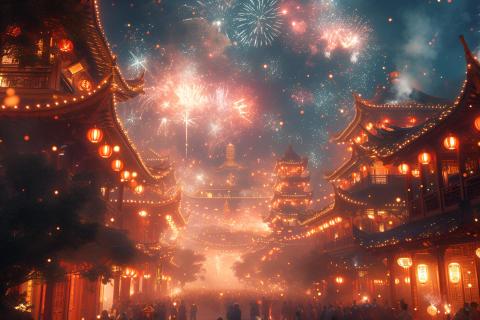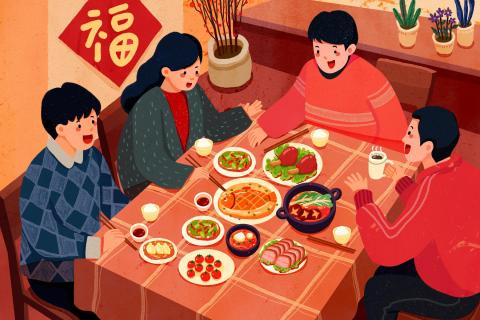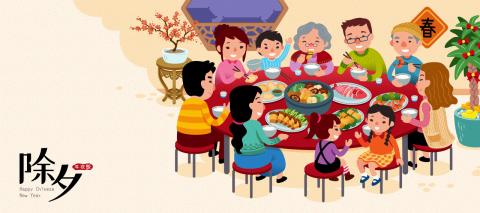New Year's Eve is the day before the Chinese New Year, symbolising bidding farewell to the old and welcoming the new, marking a significant moment for family reunions to celebrate the upcoming year. On this day, people typically engage in a series of traditional activities aimed at seeking blessings, warding off evil spirits, and welcoming the arrival of the new year. These activities also represent the rich cultural traditions of China.

Posting Spring Couplets and Door God Paintings: On New Year's Eve, it is customary to post spring couplets and Door God paintings. Spring couplets are made on red paper, conveying auspicious meanings and good wishes for the new year. This tradition dates back to the Tang Dynasty and has become an important custom for Chinese New Year celebrations. Door God paintings are displayed on both sides of house doors to ward off evil and ensure safety. Both these traditional activities are meant to pray for happiness, auspiciousness, and peace in the new year.
New Year's Eve Dinner: The New Year's Eve dinner is one of the key activities on the eve of the Chinese New Year, symbolising a moment for family gathering. During this dinner, families enjoy a sumptuous feast, including foods symbolising good luck, such as fish, rice cakes, and dumplings. The abundance and joy of the New Year's Eve dinner reflect people's expectations for the new year and their love for life.

Staying Up Late and Setting Off Firecrackers: Staying up late and setting off firecrackers are ancient traditions on Chinese New Year's Eve. During this time, families take part in traditional activities like making dumplings and watching the New Year's Eve gala until the first sound of firecrackers marks the beginning of the new year. Setting off firecrackers is believed to drive away evil spirits and bring joy and peace.
The New Year's Eve dinner has special significance and symbolic meaning. In addition to satisfying the taste buds, each dish represents a blessing and expectation. Here are six essential dishes, each not only delicious but also carrying auspicious meanings:

Fish: Fish is an indispensable dish of the Chinese New Year's Eve dinner, symbolising surplus year after year. Eating fish signifies prosperity and abundance in the new year. Additionally, fish is a protein-rich and vitamin-packed food, regarded as beneficial for health.
Dumplings: Dumplings are a traditional Northern Chinese New Year's Eve dish, representing reunion and harmony. Eating dumplings symbolises the reunion of the whole family and a happy and healthy life. The shape of dumplings resembles ancient Chinese currency, symbolising wealth.
Tangyuan (Sweet Rice Balls): Tangyuan is a must-have dish for Southern Chinese New Year's Eve dinners, symbolising family reunion and happiness. Eating tangyuan signifies a harmonious family and smoothness in all endeavours. Additionally, tangyuan carries the meaning of "reunion," expressing people's yearning for their families.
Nian Gao (Sticky Rice Cake): Nian Gao is a traditional Chinese food and a common dish for the New Year's Eve dinner. It is not only delicious but also symbolizes continuous growth and progress year after year. Eating Nian Gao on New Year's Eve signifies a smooth and successful career with continuous advancements.
Chicken: Chicken is a common dish on Chinese New Year's Eve, representing good luck. Eating chicken signifies a safe and smooth new year, as well as success in one's endeavours. Additionally, chicken is a protein-rich food, regarded as contributing to overall health.
Tofu: Tofu is one of the traditional Chinese foods and a common ingredient in the New Year's Eve dinner. It is nutritious and symbolises "abundance." Eating signifies good fortune for the entire family and a happy and healthy life. Additionally, tofu carries the meaning of "abundance," representing wealth and prosperity.
Chinese New Year's Eve is one of the most important traditional festivals in China, carrying rich cultural connotations and folk customs.

